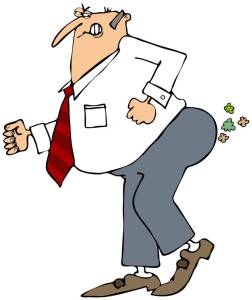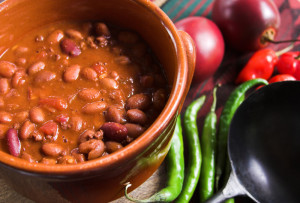Trapped Gas and IBS
There’s more than one way to pass gas.

© Can Stock Photo
I was reading some medical studies about trapped gas in the intestines cause IBS symptoms (oh, the things I do with my spare time). Apparently many symptoms of IBS are caused by trapped intestinal gas.
Several studies conclude that people with IBS don’t pass gas the way other people do (Seriously? Is there more than one way?). People who don’t have IBS pass gas at the same rate gas enters into their bowels. However people with IBS don’t move the gas properly due to peristalsis problems.
Trapped gas causes abdominal pain (agony really).

© Can Stock Photo
So when the “motor function” or peristalsis allows for a trapped gas buildup, parts of the bowel become essentially inflated, like a balloon. This can cause incredible abdominal pain, and can lead to cramps and spasms in the bowel.
Spasms in the bowel can lead to diarrhea and/or constipation (as if trapped gas agony wasn’t enough). On the other hand, intestinal spasms or cramps can close off parts of your bowel and can lead to trapped gas.
Some foods make trapped gas worse.
Any food that gives you gas can increase the chances of trapped gas, spasms and intestinal pain. Since studies show that IBS sufferers don’t move gas properly trough their bowels, the excess gas from certain foods may be more likely to cause a gas build up.
For instance if you’re even slightly lactose intolerant then dairy may get you into trouble.
Some foods may cause you to have more trapped gas troubles.
Here are some foods famous for causing gas, which for us IBS types may lead to trapped gas. Most of them contain sugars that cause gas in the digestive tract.

So delicioius, yet beans and other gas causing foods can cause massive abdominal pains.
© Can Stock PhotoBeans, broccoli, brussel sprouts – these foods contain special sugar called raffinose.
- Lactose – this sugar causes an intense reaction in some people that are lactose intolerant.
- Fructose – a sweetener hidden in many processed foods.
- Sorbitol – found in some fruits but in high concentrations in sugar free gum and candy.
- Starches – potatoes, bread, corn, pasta can all turn into simple sugars and lead to a trapped gas buildup.
- Alcohol – often contains sugars, carbohydrates and yeasts which can lead to IBS symptoms.
- Soluble fiber – large amounts of soluble fiber from beans, oat bran, peas, and many fruits.
Avoiding these foods or using them sparingly may help your IBS symptoms if trapped gas is a problem for you.
A special note about fiber though.
That last one (soluable fiber) is tricky. Not all fiber is the same. Soluble fiber breaks down in the intestines and can lead to gas and trapped gas. Insoluble fiber is important, because it helps keep things moving through your bowels. Insoluble fiber passes through your intestinal tract without breaking down into gas. It’s important to get enough fiber to help keep your bowel movements regular. Many doctors recommend 20 to 30 grams of fiber a day.
The trapped gas studies were a surprise to me.
I knew that people with IBS had troubles with gas (sometimes we feel like gas factories), but with the amount of gas some of us pass (not me of COURSE ;) ), I never thought that the ability to move gas could be different for us.
Here’s hoping for less trapped gas in your future.
Find out more about IBS causes at the Causes of Irritable Bowel Syndrome page.
Also see the Bloated Belly page
4 Replies to “Trapped Gas and IBS”
nothing helps my ibs. omg!
Have trouble passing gas. Cramps start and. Have no solution but take laxative
Stressing out
Been eliminating food
eating white rice
Help
Not sure how old this is but any chance you can link the studies? Having incredible problems with trapped gas (related, I believe, to trigger of too much fat) and I would be interested. Have noticed that when I’m having IBS problems, I don’t release gas the way I used to.
Hi Shawn – just trolling through your site to learn a little more. Looks good!
I do think that you may need to revisit your definition of fructose above, as it is a natural occurring sugar in honey and fruits. Your definition comes across as something terrible. :)